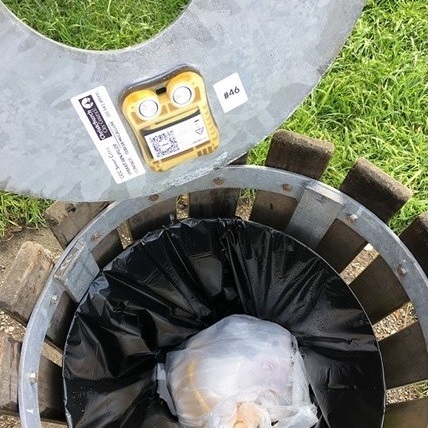Overflowing public rubbish bins are a frequent source of complaints from residents.
Our rubbish collection contractors work constantly to empty the city’s bins, but they don’t know until they arrive at the site whether they’ll find an empty bin, a full one, or an overflowing mess.
Simply adding more collection runs would help, but it would increase costs, and have a greater impact on the environment. Instead, we trialled a smart solution with our Council contractors Rec Services and Citycare, using sensors to detect rubbish levels inside bins. With accurate level data, collection times and routes can be optimised, to ensure bins are emptied in time, and only when necessary.
How the sensors work
Our trial uses LevelSense sensors, which were developed by Christchurch company PiP IoT. The sensor is a small unit mounted on the inside of the bin lid. It uses sonar to detect the rubbish level, and transmits its readings to a monitoring system.
A dashboard shows the status of each bin. When rubbish reaches a specified level, the system alerts the contractor that the bin needs emptying.
As well as detecting fullness, the sensors have a few additional smarts: a heat sensor to alert contractors if there is a fire in the bin, a tilt sensor so we know when the bin lid has been opened, a vibration sensor so we know if the bin is being vandalised, and a GPS unit for accurate positioning.
Anticipated outcomes
- Reduction in overflowing rubbish bins – Overflowing rubbish is a breeding ground for bacteria, insects, and pests. It’s a public nuisance, and unpleasant for residents and visitors to our garden city.
- Reduction in CO2 emissions and pollution – More efficient collection routing puts fewer rubbish collection trucks on the road for less time, resulting in lower fuel consumption and lower greenhouse gas emissions. It also means less noise and air pollution.
- Reduction in operational costs – Managing waste is expensive. Bin level sensors and monitoring solutions can reduce waste collection costs by up to 50 per cent. Making fewer, shorter runs reduces driver hours, fuel usage, and truck maintenance, and decreases wear and tear on our road network.
- Better planning – Council operational managers can find out whether we have the right number of bins in the right places to meet public demand.
- Information about bin use (or misuse) – Detailed level information helps us to identify patterns in bin usage. For example, sudden spikes in rubbish levels at night can indicate that household rubbish is being dumped illegally.
What’s next
Smart Cities Christchurch is working with local contractor Citycare and local manufacturer PiP IoT to deploy 100 bin sensors across Christchurch.



